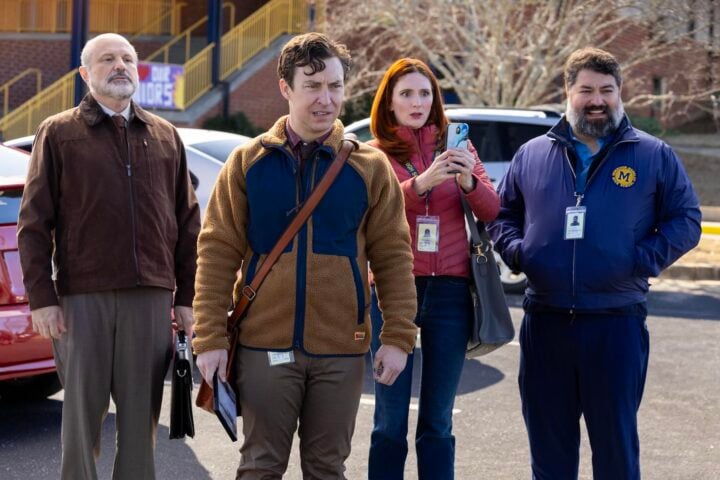When it debuted last year, Brian John Alvarez’s English Teacher felt like we’d been watching it for years. Its characters, comedy, and rhythm seemed to come into the world fully formed. And, in its sophomore year, it continues to thrive in a comfortable groove.
Season two returns to Austen’s Morrison-Henley High School, where Evan (Alvarez) is still teaching English alongside his best friend, Gwen (Alvarez’s real-life bestie Stephanie Koenig), and conservative-but-not-really football coach Markie (Sean Patton). Evan’s on-again-off-again romance with Malcolm (Jordan Firstman) has been nudged forward into a stable(ish) relationship and Markie’s undeclared love for Gwen continues to simmer, but, by and large, English Teacher is content to remain faithful to its previously established syllabus.
Almost all of the new season’s 10 episodes adhere to the same basic setup, with one character (usually Evan) spotting a problem that no one else really cares about and imposing a solution that inevitably proves inadequate, and always in the most hilariously unexpected way. Take, for example, the episode “Trash,” where Evan fills the school with environmentally friendly, talking smart-trashcans that demand that white males go to the back of the line so that minority students can deposit their trash first.
The season maintains English Teacher’s knack for using hot-button issues as a jumping off point to, rather than self-righteously satirize one side or another, engage in silly bits of business. So a debate about affirmative action devolves into Evan obsessing over whether he might be a “DEI hire,” while a reflection on Covid turns into a lesson about the humiliation of putting on a bad school play.

Classic sitcoms are clearly an influence on English Teacher—episode three, “Grant’s Dinner Party,” even features a clever spin on the well-worn “surely this character is gay” plotline—but the show’s comic sensibilities are also extremely modern. Especially of note is the speed at which the series can set a scene, nail a few punchlines, and then move on to the next one, with the skills Alvarez honed on TikTok serving him extremely well. There’s something a little reminiscent of classic Simpsons in this show’s ability to start a story in one place and spin it off somewhere completely different, all in the space of 20-some-odd, tightly written minutes—and all while rattling off jokes with an astonishingly high success rate.
English Teacher also has a knack for closing out a scene with a comedic non sequitur that leaves the viewer wanting more. In episode five, “Evan’s Mom,” Evan’s mother pays him a visit, which leads to him having a long, heartfelt conversation with his class about how complicated these relationships can be. It’s a sweet, thoughtful discussion capped by a student (Ben Bondurant) admitting in perfect deadpan: “My relationship to my folks is simple. They’re suing me.”
Evan’s students remain a kind of phone-addicted Greek chorus to his antics. Critically, the Gen Z lot aren’t presented as entitled, too-online weirdos or perfectly progressive little angels here to save us all. They’re no more or less messed up than Evan and his generation, just differently so, which makes the clashes between the two feel both fairer and way funnier.
And then there’s the man caught in the middle of these intra-school conflicts, Principal Grant Moretti (Enrico Colantoni, who brings a kindly exasperation to the character). Grant continues to operate, in his unassuming way, as the heart of the series: a deeply normal, very tired man who’s just trying to get through another school day without getting canceled.
The season finale suggests that English Teacher will be looking to evolve in the future, with the current crop of students moving on and the teachers going through some major relationship changes. For now, though, it’s found the sort of cozy stasis that truly great sitcoms flourish in.
Score:
Cast: Brian Jordan Alvarez, Stephanie Koenig, Enrico Colantoni, Sean Patton, Carmen Christopher, Jordan Firstman Network: FX
If you can, please consider supporting Slant Magazine.
Since 2001, we’ve brought you uncompromising, candid takes on the world of film, music, television, video games, theater, and more. Independently owned and operated publications like Slant have been hit hard in recent years, but we’re committed to keeping our content free and accessible—meaning no paywalls or fees.
If you like what we do, please consider subscribing to our Patreon or making a donation.

